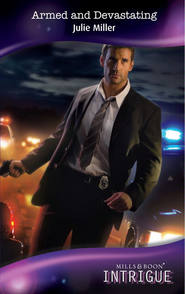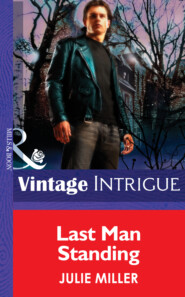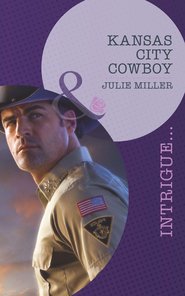По всем вопросам обращайтесь на: info@litportal.ru
(©) 2003-2024.
✖
Forbidden Captor
Настройки чтения
Размер шрифта
Высота строк
Поля
Cameron crumpled the sheet and blanket inside his fist. “Fowler’s on American soil, I guarantee it.”
“Both his victims were military, both were part of the covert strike team that was running training ops for an intel incursion into Lukinburg. The executed prisoner photo was delivered in Washington, D.C., with Fowler’s usual demand—if the UN insists on sending our men into Lukinburg, then he’ll find a way to stop them.”
“By killing off hostages one by one?” Cameron shook his head. “Terrorist tactics aren’t going to change the government’s mind.”
Folding his long, olive-skinned fingers together, Trevor leaned forward. “He’s probably sending a subtle message to you, too. What he’s doing to these soldiers, he intends to do to your bounty hunters.”
The bad blood between Cameron Murphy and Boone Fowler went back a long way. “Dammit, Blackhaw—Fowler murdered my sister for his cause. How many other innocent lives has he erased in the name of what he calls patriotism? He’s taken potshots at every one of us—hit us where it hurts the most. Why can’t we get this creep?”
“We will. Campbell, Powell, the sarge, Riley Watson, Brown and the others—we’ve all sworn to end this bastard’s reign of terror. Fowler’s the one who made this war personal. But we intend to finish it. I promise you that.”
A painful breath rasped through Cameron’s lungs. Though his dark eyes remained sharply focused, his battered body was fading toward much-needed sleep. “How are we gonna do that if we can’t find him?”
“I’ve activated every contact we have around the country. There’s a Special Forces unit waiting to assist us the minute we know anything. Don’t think for one minute your men—the men we fought with down in San Ysidro and in Africa and the men you hand-picked to work for you now—are sitting in a cell somewhere twiddling their thumbs.” Trevor tucked the graphic photos inside his jacket and stood. “If I know Sergeant Martin and the others, they’ll find a way to contact us.”
Cameron nodded. “Then let’s be ready to roll.”
TASIYA SMOOTHED HER PALMS down the length of her cream-colored sweater and steadied her nerves before slipping the elastic band of keys Marcus had given her around her wrist. Then she unlocked the wheels of her stainless steel cart and pushed it out of the kitchen into the breezeway that separated the refurbished quarters housing the militia members from the prison section of the compound.
She passed back through centuries of time as she unlocked a thick wooden door and entered the long passageway that housed the prisoners. In this part of the stronghold, little had been done to reclaim it from its colonial past. The uneven settling of the stones paving the floor created an uneven, repetitive clanking sound that chafed her nerves as her cart bounced over bumps and into ruts.
With no central heating and few covered windows, the chilly night air off the ocean drifted in and caught in the dark, dank corners. The breeze swirled her skirt around her knees. She’d brought one pair of denim jeans with her, which she suspected were going to become her new uniform if she couldn’t shake the damp chill that permeated her skin.
Behind locked doors she could hear the hum of generators and other machinery, which she supposed had something to do with the island’s alarm system. Driven more by survival than curiosity, she didn’t test her keys in any door until she reached the rusted iron monstrosity Marcus Smith had shown her earlier. After unlatching a modern steel padlock, she scraped the dead bolt across its hinge. The door itself groaned from weight and age as she shoved it open and entered the prison proper.
Foul, musty air stung her nostrils and made her eyes water. It was inhumane to keep a man in these conditions, but then she supposed kindness and compassion weren’t on Boone Fowler’s list of virtues.
Besides the padlock she’d slipped into her pocket to keep from being trapped inside herself, the only visible hint of technology was the single electric wire that ran the length of the stone walls to illuminate a bare lightbulb every twenty feet or so. And she suspected that had more to do with security than with the prisoners’ comfort.
Unintelligible snippets of conversation teased her ears and bounced along the walls, but the prisoners fell silent as she approached the steel bars that separated her from the men she was feeding. They all watched her with assessing, unfriendly eyes. Three soldiers in one cell. Four in another. Then three and three more.
They took the small loaves of bread and cups of water she poured for them with a variety of comments at seeing a woman, and a few jeers as they mistook her for a member of Fowler’s militia. But hunger quickly overrode their defiance, and they sat down to eat with a pitiful gusto that reminded her of some of the poor families she’d seen in Lukinburg.
Another key unlocked a second iron door. In this long, twisting catacomb, there were four isolated cells, each one separated from the other by thick stone walls and steel bars.
Here the men sat, bound by leg irons and wrist manacles, one to each cell like condemned murderers. These men didn’t wear uniforms like the others, but civilian clothing.
The first one had unusual blue-green eyes that looked right through her without blinking. She idly wondered if the blood on his torn shirt was his own or someone else’s. He never moved until she had passed on by. The next one stood up when she approached. Despite the bruising and swelling around one eye, he was a handsome man. He nodded a silent thank-you, then watched her every move until she’d rounded the corner out of sight. The third was deep in his own thoughts. And pain, she suspected, noting a dozen or so cuts across his roughly shaved head. Tasiya quickly set the bread and cup of water just outside the bars on the floor in front of his cell and moved on.
When she turned the corner to the last, most isolated of all the chambers, Tasiya hesitated. The lightbulb here had burned out, leaving the only illumination to the bulb twenty feet behind her, and the moonlight that streamed in from what must be the cell itself.
Tasiya silently cursed her luck. She could either travel all the way back to the kitchen for a flashlight, or she could swallow her fear of the unknown enemy around the corner and follow the wall with her hand until it opened up onto the cell itself.
Weighing the options of retracing her steps through the dungeonlike chambers past sixteen prisoners versus checking on the welfare of one man made her decision a quick one. If she could face down the guns of Dimitri Mostek’s men, she could certainly handle a shadowy passageway and an unarmed man who was locked safely behind bars.
The stones were smooth with age but sticky with moisture and dust as she trailed her fingers across them. Leaving her cart behind, Tasiya headed toward the shaft of moonlight. When she reached the end of the wall, she peeked around into the cell.
She caught a silent breath.
On the other side of those shiny steel bars stood the hardest-looking man she’d ever seen. He wore only a pair of jeans that hung loosely enough on his hips to reveal a strip of the white briefs that hugged his waist. He stood with his back to her, his arms reaching above his head. He was fiddling with something at the base of the window, doing something with the rusty iron brace at his wrist. He wasn’t any taller than her father’s six feet of height, but he was massive across his shoulders, arms and back. Twice as broad as her father. Muscled and formed in a way that reminded her of tanks and mountains.
He was all male from the short clip of his dark brown hair to the flexing curve of his powerful thighs and buttocks.
And even in the moonlight that mottled his skin, she could see he was horribly disfigured.
Raised, keloid scars formed a meshwork pattern from his waistband up to his left shoulder, where the dimpled terrain of a faded burn mark took over and disappeared over onto his chest, up the side of his neck and down to his elbow.
Tasiya pressed her fingers to her lips to stifle a gasp. Her stomach clenched and her heart turned over in compassion. My God, how this man had suffered.
To her horror, he froze at her nearly inaudible gasp. With precise deliberation, he lowered his arms and slowly turned.
Shrinking back against the cold stone wall opposite his cell, Tasiya stared. The front view was nearly as harsh as the back. She could see, now, that the shadows that dappled his skin weren’t all tricks of the dim light, but from bruising, as well. The old burn injury covered nearly a quarter of his chest and one side of his neck and jaw. His chin was square and pronounced. One carved cheekbone was bloody with the slash of an open wound. And the swelling around his left eye distorted the shape of a face that would have been harsh and forbidding under any circumstances.
Without a word he took a step toward her. But when Tasiya, trapped in a circle of moonlight, flattened her back against the wall, he stopped. His mouth opened as if he wanted to say something, but he shrugged instead. Tasiya’s gaze instantly darted to watch the fascinating ripple and subsequent control of all that muscle.
When she realized he’d stopped and was even retreating to the rear of his cell to alleviate her fear of him, Tasiya’s breath seeped out on a deep, embarrassed sigh. This man knew he was frightening to look at, imposing to get close to. Others had cowered from him before.
What a lonely, terrible existence that must be.
Sensing some of his pain, Tasiya looked up into his face.
The only thing not forbidding about the prisoner was his eyes. Enhanced by the glow of the moon, they were a cool, soothing shade of gray that reminded her of the quiet, wintry skies of her homeland.
And they meant her no harm.
Unlike the lechery she’d seen in Marcus’s and Dimitri’s eyes, the cold condescension she’d seen in Boone Fowler’s expression, or the blank, preoccupied stares she’d seen from the other prisoners, this man was making a point of putting her at ease.
Responding to that unexpected civility, Tasiya summoned her courage and retrieved her cart. She wrapped the last small, crusty loaf, which couldn’t be more than a snack to a man his size, in a napkin and poured some water into the last metal cup. Then she knelt down in front of the steel bars and laid the bread and water just in front of them, the way she’d been instructed.
When she heard the rattle of his chains as he moved to pick up his meal, she shot to her feet and backed well out of arm’s reach. Compassion or not, he still made two of her, he was still a prisoner, and he still frightened her.
But in her haste to put distance between them, she’d kicked the cup over and spilled the water. Tasiya watched the puddle quickly seep into the cracks between the stones on the floor.
She couldn’t leave the man without water.
She glanced up at him. He was staring at her, with ever-watchful eyes, but he wasn’t condemning her. He glanced down at the cup, and she knew what she had to do.
Shaking her head at her own skittishness, Tasiya picked up the pitcher of water from her cart. She had far greater things to fear from men far more handsome than this one. Good looks didn’t make a hero. Scars didn’t make an enemy.
This was her job. This was for her father.
“I am sorry,” she whispered, picking up the cup and pouring him fresh water. “Here.”
With a show of bravery, prompted by human compassion, she reached through the bars herself and held the cup out to him. He stared at it for a moment, as if he didn’t understand the gesture. Long, silent moments passed. But she waited until his agile, nicked-up fingers closed around the cup. She quickly pulled away as he gently took it from her grasp.
“Thanks.”
The deep-pitched voice startled her. The husky tone resonated in that big chest and washed over her like a warm caress.
“Both his victims were military, both were part of the covert strike team that was running training ops for an intel incursion into Lukinburg. The executed prisoner photo was delivered in Washington, D.C., with Fowler’s usual demand—if the UN insists on sending our men into Lukinburg, then he’ll find a way to stop them.”
“By killing off hostages one by one?” Cameron shook his head. “Terrorist tactics aren’t going to change the government’s mind.”
Folding his long, olive-skinned fingers together, Trevor leaned forward. “He’s probably sending a subtle message to you, too. What he’s doing to these soldiers, he intends to do to your bounty hunters.”
The bad blood between Cameron Murphy and Boone Fowler went back a long way. “Dammit, Blackhaw—Fowler murdered my sister for his cause. How many other innocent lives has he erased in the name of what he calls patriotism? He’s taken potshots at every one of us—hit us where it hurts the most. Why can’t we get this creep?”
“We will. Campbell, Powell, the sarge, Riley Watson, Brown and the others—we’ve all sworn to end this bastard’s reign of terror. Fowler’s the one who made this war personal. But we intend to finish it. I promise you that.”
A painful breath rasped through Cameron’s lungs. Though his dark eyes remained sharply focused, his battered body was fading toward much-needed sleep. “How are we gonna do that if we can’t find him?”
“I’ve activated every contact we have around the country. There’s a Special Forces unit waiting to assist us the minute we know anything. Don’t think for one minute your men—the men we fought with down in San Ysidro and in Africa and the men you hand-picked to work for you now—are sitting in a cell somewhere twiddling their thumbs.” Trevor tucked the graphic photos inside his jacket and stood. “If I know Sergeant Martin and the others, they’ll find a way to contact us.”
Cameron nodded. “Then let’s be ready to roll.”
TASIYA SMOOTHED HER PALMS down the length of her cream-colored sweater and steadied her nerves before slipping the elastic band of keys Marcus had given her around her wrist. Then she unlocked the wheels of her stainless steel cart and pushed it out of the kitchen into the breezeway that separated the refurbished quarters housing the militia members from the prison section of the compound.
She passed back through centuries of time as she unlocked a thick wooden door and entered the long passageway that housed the prisoners. In this part of the stronghold, little had been done to reclaim it from its colonial past. The uneven settling of the stones paving the floor created an uneven, repetitive clanking sound that chafed her nerves as her cart bounced over bumps and into ruts.
With no central heating and few covered windows, the chilly night air off the ocean drifted in and caught in the dark, dank corners. The breeze swirled her skirt around her knees. She’d brought one pair of denim jeans with her, which she suspected were going to become her new uniform if she couldn’t shake the damp chill that permeated her skin.
Behind locked doors she could hear the hum of generators and other machinery, which she supposed had something to do with the island’s alarm system. Driven more by survival than curiosity, she didn’t test her keys in any door until she reached the rusted iron monstrosity Marcus Smith had shown her earlier. After unlatching a modern steel padlock, she scraped the dead bolt across its hinge. The door itself groaned from weight and age as she shoved it open and entered the prison proper.
Foul, musty air stung her nostrils and made her eyes water. It was inhumane to keep a man in these conditions, but then she supposed kindness and compassion weren’t on Boone Fowler’s list of virtues.
Besides the padlock she’d slipped into her pocket to keep from being trapped inside herself, the only visible hint of technology was the single electric wire that ran the length of the stone walls to illuminate a bare lightbulb every twenty feet or so. And she suspected that had more to do with security than with the prisoners’ comfort.
Unintelligible snippets of conversation teased her ears and bounced along the walls, but the prisoners fell silent as she approached the steel bars that separated her from the men she was feeding. They all watched her with assessing, unfriendly eyes. Three soldiers in one cell. Four in another. Then three and three more.
They took the small loaves of bread and cups of water she poured for them with a variety of comments at seeing a woman, and a few jeers as they mistook her for a member of Fowler’s militia. But hunger quickly overrode their defiance, and they sat down to eat with a pitiful gusto that reminded her of some of the poor families she’d seen in Lukinburg.
Another key unlocked a second iron door. In this long, twisting catacomb, there were four isolated cells, each one separated from the other by thick stone walls and steel bars.
Here the men sat, bound by leg irons and wrist manacles, one to each cell like condemned murderers. These men didn’t wear uniforms like the others, but civilian clothing.
The first one had unusual blue-green eyes that looked right through her without blinking. She idly wondered if the blood on his torn shirt was his own or someone else’s. He never moved until she had passed on by. The next one stood up when she approached. Despite the bruising and swelling around one eye, he was a handsome man. He nodded a silent thank-you, then watched her every move until she’d rounded the corner out of sight. The third was deep in his own thoughts. And pain, she suspected, noting a dozen or so cuts across his roughly shaved head. Tasiya quickly set the bread and cup of water just outside the bars on the floor in front of his cell and moved on.
When she turned the corner to the last, most isolated of all the chambers, Tasiya hesitated. The lightbulb here had burned out, leaving the only illumination to the bulb twenty feet behind her, and the moonlight that streamed in from what must be the cell itself.
Tasiya silently cursed her luck. She could either travel all the way back to the kitchen for a flashlight, or she could swallow her fear of the unknown enemy around the corner and follow the wall with her hand until it opened up onto the cell itself.
Weighing the options of retracing her steps through the dungeonlike chambers past sixteen prisoners versus checking on the welfare of one man made her decision a quick one. If she could face down the guns of Dimitri Mostek’s men, she could certainly handle a shadowy passageway and an unarmed man who was locked safely behind bars.
The stones were smooth with age but sticky with moisture and dust as she trailed her fingers across them. Leaving her cart behind, Tasiya headed toward the shaft of moonlight. When she reached the end of the wall, she peeked around into the cell.
She caught a silent breath.
On the other side of those shiny steel bars stood the hardest-looking man she’d ever seen. He wore only a pair of jeans that hung loosely enough on his hips to reveal a strip of the white briefs that hugged his waist. He stood with his back to her, his arms reaching above his head. He was fiddling with something at the base of the window, doing something with the rusty iron brace at his wrist. He wasn’t any taller than her father’s six feet of height, but he was massive across his shoulders, arms and back. Twice as broad as her father. Muscled and formed in a way that reminded her of tanks and mountains.
He was all male from the short clip of his dark brown hair to the flexing curve of his powerful thighs and buttocks.
And even in the moonlight that mottled his skin, she could see he was horribly disfigured.
Raised, keloid scars formed a meshwork pattern from his waistband up to his left shoulder, where the dimpled terrain of a faded burn mark took over and disappeared over onto his chest, up the side of his neck and down to his elbow.
Tasiya pressed her fingers to her lips to stifle a gasp. Her stomach clenched and her heart turned over in compassion. My God, how this man had suffered.
To her horror, he froze at her nearly inaudible gasp. With precise deliberation, he lowered his arms and slowly turned.
Shrinking back against the cold stone wall opposite his cell, Tasiya stared. The front view was nearly as harsh as the back. She could see, now, that the shadows that dappled his skin weren’t all tricks of the dim light, but from bruising, as well. The old burn injury covered nearly a quarter of his chest and one side of his neck and jaw. His chin was square and pronounced. One carved cheekbone was bloody with the slash of an open wound. And the swelling around his left eye distorted the shape of a face that would have been harsh and forbidding under any circumstances.
Without a word he took a step toward her. But when Tasiya, trapped in a circle of moonlight, flattened her back against the wall, he stopped. His mouth opened as if he wanted to say something, but he shrugged instead. Tasiya’s gaze instantly darted to watch the fascinating ripple and subsequent control of all that muscle.
When she realized he’d stopped and was even retreating to the rear of his cell to alleviate her fear of him, Tasiya’s breath seeped out on a deep, embarrassed sigh. This man knew he was frightening to look at, imposing to get close to. Others had cowered from him before.
What a lonely, terrible existence that must be.
Sensing some of his pain, Tasiya looked up into his face.
The only thing not forbidding about the prisoner was his eyes. Enhanced by the glow of the moon, they were a cool, soothing shade of gray that reminded her of the quiet, wintry skies of her homeland.
And they meant her no harm.
Unlike the lechery she’d seen in Marcus’s and Dimitri’s eyes, the cold condescension she’d seen in Boone Fowler’s expression, or the blank, preoccupied stares she’d seen from the other prisoners, this man was making a point of putting her at ease.
Responding to that unexpected civility, Tasiya summoned her courage and retrieved her cart. She wrapped the last small, crusty loaf, which couldn’t be more than a snack to a man his size, in a napkin and poured some water into the last metal cup. Then she knelt down in front of the steel bars and laid the bread and water just in front of them, the way she’d been instructed.
When she heard the rattle of his chains as he moved to pick up his meal, she shot to her feet and backed well out of arm’s reach. Compassion or not, he still made two of her, he was still a prisoner, and he still frightened her.
But in her haste to put distance between them, she’d kicked the cup over and spilled the water. Tasiya watched the puddle quickly seep into the cracks between the stones on the floor.
She couldn’t leave the man without water.
She glanced up at him. He was staring at her, with ever-watchful eyes, but he wasn’t condemning her. He glanced down at the cup, and she knew what she had to do.
Shaking her head at her own skittishness, Tasiya picked up the pitcher of water from her cart. She had far greater things to fear from men far more handsome than this one. Good looks didn’t make a hero. Scars didn’t make an enemy.
This was her job. This was for her father.
“I am sorry,” she whispered, picking up the cup and pouring him fresh water. “Here.”
With a show of bravery, prompted by human compassion, she reached through the bars herself and held the cup out to him. He stared at it for a moment, as if he didn’t understand the gesture. Long, silent moments passed. But she waited until his agile, nicked-up fingers closed around the cup. She quickly pulled away as he gently took it from her grasp.
“Thanks.”
The deep-pitched voice startled her. The husky tone resonated in that big chest and washed over her like a warm caress.











